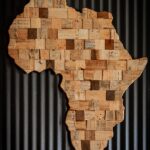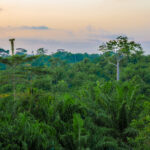
A recent report by the Institute for Security Studies (ISS) reveals that illegal logging in Mali generated around $13.8 million between 2019 and 2021, providing significant financial support to extremist organisations such as the Jama’a Nusrat al-Islam wal-Muslimin (JNIM) or ‘Groupe de Soutien à l’Islam et aux Musulmans’ (Support Group for Islam and Muslims, GSIM).
The ISS report also highlights the role of corruption in maintaining this illegal trade. “Malian forestry officials and civil servants often turn a blind eye to the illegal exploitation and export of timber, particularly Kosso, a protected species of rosewood,” it states.
Between 2020 and 2022, some 220,000 Kosso logs were illegally exported to China through the port of Dakar in Senegal.
Illicit economies play a key role in Jnim’s expansion strategy, especially in securing resources and legitimacy in the areas under their control. There are various accounts of the group’s presence in and control of mining, logging and illicit trading sectors across the Sahel.
Since 2021, Jnim’s incursions into the southern regions have targeted the Baoulé reserves situated between Kayes and Koulikoro. Jnim fighters are not involved in logging itself. Instead, they control the forest reserves and demand fees from illegal loggers wanting to access the area.
Jnim also actively responded to grievances between loggers and bandits operating within the forest. Loggers provided the whereabouts of bandits to the insurgents, who were more proactive than security agents. People in the area told ISS that Jnim dislodged the bandits, often killing those who did not align with its dictates. Jnim’s response to this longstanding threat against the loggers was a significant move that further built relationships with communities seeking protection and better livelihoods.
The logging and export of Kosso — an endangered rosewood tree protected by the Convention on International Trade in Endangered Species of Wild Fauna and Flora — from areas controlled by Jnim involves significant bribery of forestry agents and government officials. Chinese traders are also reportedly involved in large-scale logging and timber trafficking, particularly Kosso, from Mali to China.
Over three million tons of West African Rosewood have been shipped to China since 2017. The logs are manufactured into high-end Chinese furniture and exported worldwide as part of a multi-billion dollar furniture industry.
In November, Wood Central reported that CITES had banned the felling, transportation, and exportation of West African Rosewood in response to Chinese traders’ “industrial-scale” exploitation of the timbers. That move, according to environmental watchdog forest-trends, is an acknowledgment that past measures to protect the species, known as P. erinaceus, have “not worked and that CITES Parties (who are responsible for the measures to verify the legality and sustainability of trade, have not been able to eradicate illegal trade alone.”
Now, a new report by the Environmental Investigation Agency alleges that the multi-billion dollar trade is showing no signs of slowing, despite CITES and the Gambian government’s both introducing outright bans on the harvest and distribution of the timbers.
Drawing from Center fro Africa Strategic Stiudies recent report, which is based on recent research and programmatic work at the Africa Center for Strategic Studies, we have analyzed three ways that illegal logging affects national security and what that means for current measures to counter it.
Illegal logging is a growing feature of transnational organized crime in Africa, often facilitated by the collusion of senior officials, with far-reaching security and environmental implications for the countries affected.
Salif Sadio, the leader MFDC rebels has dismissed claims that his men are engage into illegal timber logging trade, adding that part of their deals for independence is to end illegal timber trade in the region.
Speaking to reporters over the weekend, he said: “we are fighting illegal timber logging and that’s part of our conditions for our freedom because any timber you see in Senegal comes either from Casamance or The Gambia or other countries. It is not true, they are lying.
Click here to access the Global Illegal Logging and Associated Trade (ILAT) Risk assessment tool and to download the Forest Trends User Guide describing the functionality of the ILAT Risk Data Tool.
Click here to access the Cattle Data Tool.






